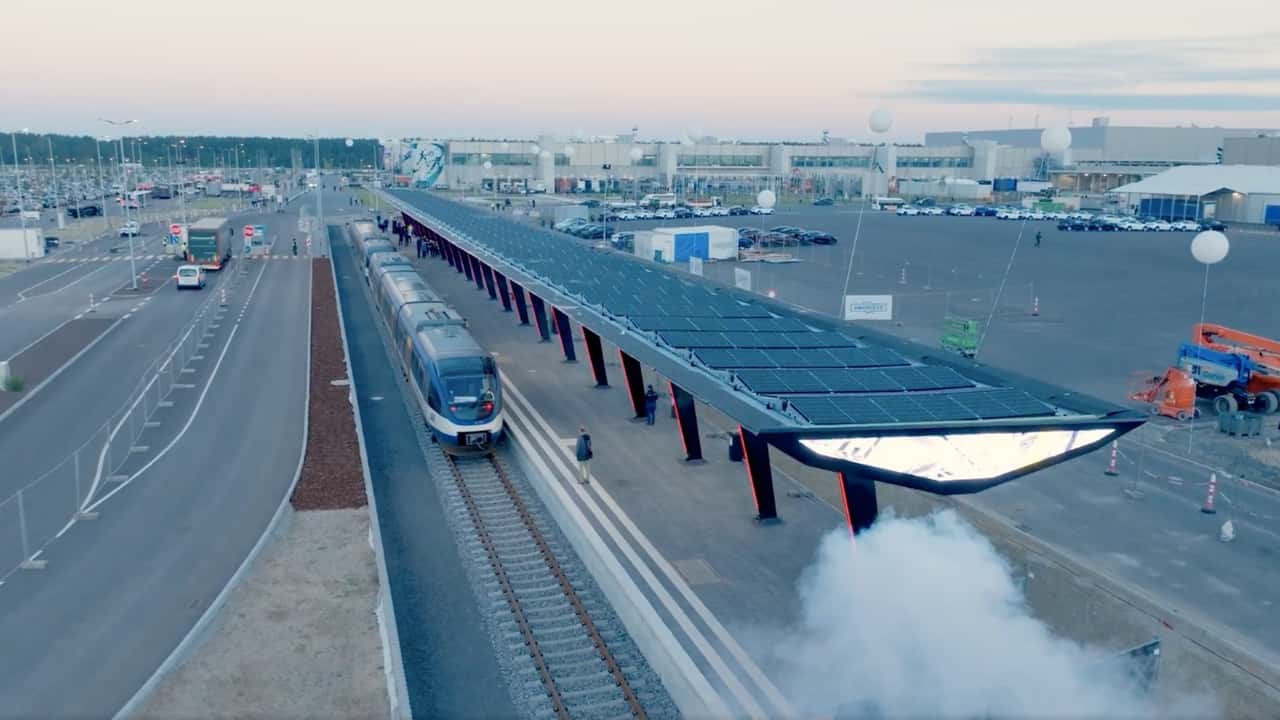Tesla has introduced a train shuttle service at its Gigafactory Berlin in Germany, marking the first time the company has offered rail access to its workers. The announcement was made on X (formerly Twitter) by Tesla Europe, stating that the train shuttle is capable of transporting 400 people per ride. A video was shared showcasing the first train arriving at the new Tesla station on the factory premises, featuring a solar panel-covered canopy on the train platform.
A Tesla employee, Romain Hedouin, shared a video on social media capturing the relaxed atmosphere inside the train, with a DJ playing music during the ride. However, some users pointed out that the train is not electrified, which seems ironic for a factory that produces electric vehicles. It should be noted that Tesla does not own the train itself, as it is operated by NEB (Die Niederbarnimer Eisenbahn). However, Tesla does own the railroad tracks, which were acquired from German Regional Railway Group DRE earlier this year.
The train shuttle is expected to make approximately 60 trips per day, from Monday to Friday, with a frequency of every 40 minutes. This will transport over 1,500 people directly to the Gigafactory Berlin at each shift change. The train service is free for both Tesla employees and citizens, operating between the Fangschleuse station and the factory premises in Grünheide. The new train service replaces the previous bus shuttle that transported workers between the Erkner train station and Gigafactory Berlin, and it is expected to help alleviate road traffic congestion in the area.
Overall, the introduction of the train shuttle service at Gigafactory Berlin demonstrates Tesla’s commitment to providing convenient and sustainable transportation options for its workforce.
Diesel-Powered Train Shuttle Opens at Tesla’s Giga Berlin
Tesla’s Giga Berlin, the highly anticipated electric vehicle production facility located in Grünheide, Germany, has recently unveiled a surprising addition to its infrastructure – a diesel-powered train shuttle. This unexpected move has raised eyebrows among industry experts and environmentalists, prompting discussions about the sustainability and credibility of the renowned electric car manufacturer.
The train shuttle, which runs on traditional diesel-powered locomotives, has been introduced by Tesla as a means to transport materials and components between different areas of the expansive Giga Berlin complex. This development comes as a stark contrast to the company’s image as a leader in sustainable transportation and renewable energy solutions.
Critics argue that the decision to utilize diesel-powered locomotives undermines Tesla’s commitment to reducing carbon emissions and promoting a cleaner future. Electric vehicles have long been hailed as a potential solution to mitigate transportation’s significant contribution to global carbon emissions. However, Tesla’s choice to adopt a diesel train shuttle has cast doubt on the sincerity of the company’s environmental endeavors.
In response to the criticism, Tesla has defended the use of diesel-powered trains as a temporary solution to logistical challenges faced during the construction of Giga Berlin. The company emphasizes that the installation of an electric train infrastructure would have required substantial time and resources, potentially delaying the project’s completion. Tesla asserts that the diesel-powered train shuttle is a practical and efficient means to transport necessary materials while the construction of the electric train infrastructure is underway.
Critics argue that Tesla’s defense is not sufficient to justify the contradiction between the company’s overall sustainability goals and its current utilization of diesel-powered transport. The choice of diesel-powered locomotives not only undermines Tesla’s reputation as an advocate for clean transportation but also contradicts the values that the company claims to uphold.
Furthermore, environmentalists argue that Tesla’s decision raises questions about the viability and feasibility of the Giga Berlin project. If Tesla, a company renowned for its innovations in electric vehicle technology, cannot overcome the logistical challenges of implementing a sustainable transportation system within its own production facility, it raises doubts about its overall commitment to sustainable practices.
The controversy surrounding the diesel-powered train shuttle at Giga Berlin highlights the increasing importance of holding corporations accountable for their environmental claims. In an era of heightened awareness regarding climate change and the need for sustainable solutions, companies must ensure their actions align with their espoused values.
While Tesla’s introduction of the diesel train shuttle may be a temporary measure, it is crucial for the company to transparently address concerns about its impact on the environment and its long-term sustainability objectives. In doing so, Tesla can regain the trust of customers, investors, and the public, reaffirming its commitment to a cleaner and more sustainable future.
As Tesla’s Giga Berlin continues to develop and expand, it faces the challenge of balancing economic growth with environmental responsibility. By acknowledging and rectifying the contradiction presented by the diesel-powered train shuttle, Tesla has the opportunity to showcase its commitment to innovation, sustainability, and the values that have made it a global leader in the electric vehicle industry.

